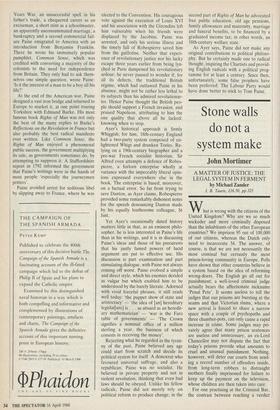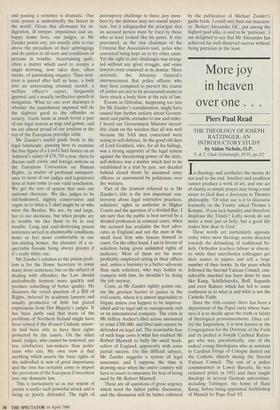Stone walls do not a system make
John Mortimer
A MATTER OF JUSTICE: THE LEGAL SYSTEM IN FERMENT by Michael Zander I. B. Tauris, £16.50, pp.323 What is wrong with the citizens of the United Kingdom? Why are we so much wickeder and more criminally disposed than the inhabitants of the other European countries? We imprison 95 out of 100,000 of out citizens, whereas the Dutch only need to incarcerate 34. The answer, of course, is that we are not necessarily the most criminal but certainly the most prison-loving community in Europe. Polls have shown that other countries believe in a system based on the idea of reforming wrong-doers. The English go all out for punishment; a well-loved criminal judge actually bears the affectionate nickname 'Penal Pete'. It seems useless to tell the judges that our prisons are bursting at the seams and tkat Victorian slums, where a new arrival is forced to share a narrow space with a couple of psychopaths and three chamber-pots, can only cause a rapid increase in crime. Some judges may pri- vately agree that many prison sentences are useless and unnecessary, an ex-Lord Chancellor may not dispute the fact that today's prisons provide what amounts to cruel and unusual punishment. Nothing, however, will deter our courts from send- ing a record number of offenders inside, from long-term robbers to distraught mothers finally imprisoned for failure to keep up the payment on the television, whose children are then taken into care.
For one practising at the Criminal Bar, the contrast between reaching a verdict and passing a sentence is dramatic. Our trial system is undoubtedly the fairest in the world. Given due allowance for in- digestion, ill temper, impatience and un- happy home lives, our judges, as Mr Zander points out, are usually able to rise above the prejudices of their upbringings and do justice to all sorts and conditions of persons in trouble. Ascertaining guilt, often a matter which used to occupy a single morning, now takes days, often weeks, of painstaking enquiry. Then sent- ence is passed after half an hour, a look into an unrevealing criminal record, a welfare officer's report, frequently ignored, and a usually ineffective speech in mitigation. What no one ever discusses is whether the punishment imposed will do the slightest good to the offender or society. Gaols seem as much loved a part of our legal system as wigs and gowns, and we are almost proud of our position at the top of the European porridge table.
Mr Zander's useful guide book to the legal landscape, pausing here to examine the fine figure of a Lord Chief Justice on an Admiral's salary of £74,750 a year, there to discuss such exotic and foreign notions as the European Convention on Human Rights, (a matter of profound unimport- ance to most of our judges and legislators) does at least come to one valid conclusion. We get the sort of system that suits our national character. We like judges to be old-fashioned, slightly conservative and vague as to what a T-shirt might be or who were the Beatles. We are, by and large, fair in our decisions, but when people are in trouble we like them to be in real trouble. Long and soul-destroying prison sentences served in abominable conditions make us feel more comfortable in our law-abiding homes, the pleasure of a re- spectable fireside being always greater if it's really filthy out.
Mr Zander's solution to the prison prob- lem is for the Home Secretary to remit many more sentences; but on the subject of dealing with offenders the Law should undoubtedly ferment more quickly and produce something of better quality. He discusses the vexed question of a Bill of Rights, beloved by academic lawyers and usually productive of little but glazed expressions from Her Majesty's judges. It has been justly said that many of the problems of Northern Ireland might have been solved if the ill-used Catholic minor- ity had been able to have their rights protected by the courts. On the other hand, judges, who cannot be removed, are less satisfactory law-makers than politi- cians who can. My own view is that anything which asserts the basic rights of the individual is now of great importance and the time has certainly come to import the provisions of the European Convention into our domestic law.
This is particularly so as our system of justice is under such powerful attack and is being so poorly defended. The right of peremptory challenge to three jury mem- bers by the defence may not sound impor- tant, but it safeguarded the principal that an accused person must be tried by those who at least looked like his peers. It also prevented, as the vice chairman of the Criminal Bar Association said, juries who convicted being kept on to try other cases. Yet the right to jury challenges was strang- led without any great struggle, and some lawyers even connived at its demise. More seriously, the Attorney General's announcement that police officers who may have conspired to pervert the course of justice are not to be prosecuted seems to have struck a body blow at the rule of law.
Events in Gibraltar, happening too late for Mr Zander's consideration, might have caused him further anxiety about Govern- ment and public attitudes to law and order. I heard our Government Minister incred- ibly claim on the wireless that all was well because the SAS men concerned were acting in self-defence. In the good old days of Lord Goddard, who, for all his failings, was a strong supporter of the legal system against the threatening power of the state, self-defence was a matter which had to be established in a trial by jury, not decided behind closed doors by unnamed army officers or announced by politicians over the wireless.
Part of the ferment referred to in Mr Zander's title is the less important con- troversy about legal restrictive practices, solicitors' rights to audience in Higher Courts and the question of a divided Bar. I am sure that the public is best served by a divided profession in criminal cases, when the accused has available the best advo- cates in England and not the man in the small local firm who fancies himself in court. On the other hand, I am in favour of solicitors being given unlimited rights of audience. Most of them are far more profitably employed sitting in their offices and, unless a barrister is a better advocate than such solicitors, who may bother to compete with him, he shouldn't be doing the job anyway.
Costs, as Mr Zander rightly points out, are the greatest barrier to justice in the civil courts, where it is almost impossible to litigate unless you happen to be impover- ished and on legal aid or outrageously rich or an international company. The costs in Mr Jeffrey Archer's libel action amounted to some £300,000, and libel suits cannot be defended on legal aid. The reasonable fear of such huge costs is what has enabled Mr Robert Maxwell to bully the small book- sellers of England, apparently with some partial success. On this difficult subject, Mr Zander suggests a system of legal insurance, and I suppose the time is drawing near when the entire country will have to resort to insurance for fear of being sued by Mr Robert Maxwell.
These are all questions of great urgency which need the fullest public discussion, and the discussion will be better enforced by the publication of Michael Zander's guide book. I could only find one inaccura- cy. Robert Alexander QC, put among the highest paid silks, is said to be 'patrician'. I am delighted to say that Mr Alexander has achieved his well-deserved success without being patrician in the least.































































 Previous page
Previous page